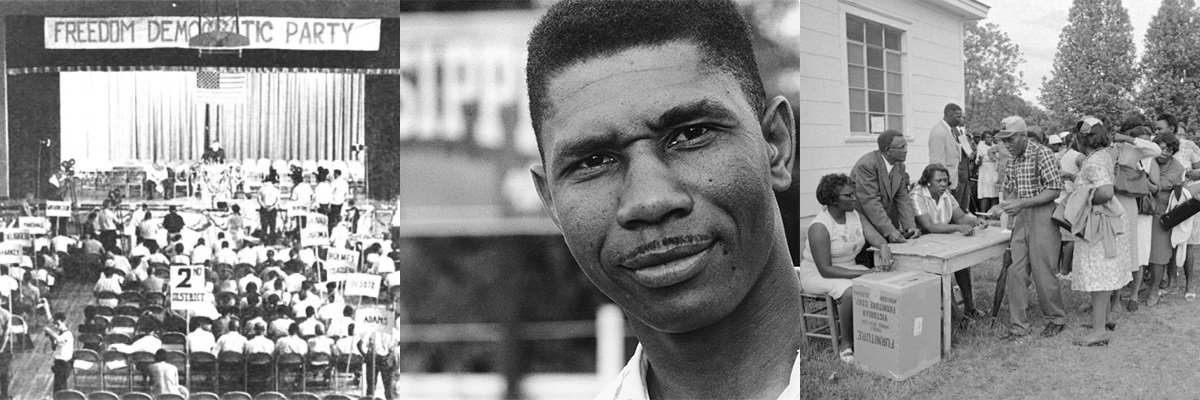Key Dates in Voting Rights History
Timeline by Emilye Crosby
This text is provided as background information for A Documents-Based Lesson on the Voting Rights Act: A Case Study of SNCC’s work in Lowndes County and the Emergence of Black Power by Emilye Crosby.
Feb. 1, 1960: Greensboro sit-ins begin and touch off the sit-in movement
March 9, 1960: Atlanta University Complex students publish “An Appeal on Human Rights.” Six days later they hold the first sit-in in Atlanta.
April 15-16, 1960: Ella Baker and the Southern Christian Leadership Conference (SCLC) host a meeting of the sit-in leaders, which leads to the founding of SNCC. Baker gives a speech that is published in the June 1960 issue of the Southern Patriot, titled “Bigger than a Hamburger.”
Spring/ Summer 1961: Freedom Rides begin and force the Kennedy Administration to be proactive in enforcing Supreme Court decisions banning segregation on interstate transportation.
Summer 1961: SNCC begins voter registration work in Miss.
Fall 1961: SNCC begins voter registration work in Southwest Georgia
Summer 1962: SNCC begins voter registration work in the Mississippi Delta. This leads to the 1964 establishment of the Mississippi Freedom Democratic Party (MFDP) and considerable national attention on white supremacist violence and racist discrimination in voting rights.
Fall 1962: SNCC begins work in Selma, Alabama (adjacent to Lowndes County)
Aug. 28, 1963: People from across the country gather for March on Washington where John Lewis delivers the SNCC speech.
July 2, 1964: Civil Rights Act of 1964 is signed into law.
Jan.-March 1965: SNCC and SCLC work together in Selma on a voting rights campaign. This leads to the Selma-to-Montgomery March (March 1965).
March 1, 1965: John Hulett and 38 other African Americans in Lowndes County go to the Courthouse together to try to register to vote.
March 7-25, 1965: SNCC and SCLC organizing efforts in Selma intensify, leading to Bloody Sunday and other events surrounding the Selma-to-Montgomery March. As the marchers go through Lowndes County, on their way from Selma to Montgomery, Stokely Carmichael and other SNCC field secretaries, make it a point to talk to people who come out to watch. They also take down their names and contact information. This is the first step in SNCC’s organizing in Lowndes.
end of March 1965: As soon as the Selma march is over, Carmichael and other SNCC field secretaries return to Lowndes and follow up with the people they met during the march.
Aug. 6, 1965: The Voting Rights Act of 1965 is signed into law.
mid-Aug. 1965: Federal registrars are sent to Lowndes County, making it easier for African Americans to register to vote.
Aug. 20, 1965: White resident Tom Coleman murders SNCC volunteer Rev. Jonathan Daniels and critically wounds Rev. Richard Morrisroe, as they and others leave jail. Coleman is later acquitted.
Dec. 1965: The Lowndes County Freedom Organization is founded.
May 3, 1966: The Lowndes County Freedom Organization holds a successful nomination convention.
May 8, 1966: SNCC gathers in Kingston Springs, Tennessee, for a staff meeting. Stokely Carmichael is elected chair and the organization adopts three key policy decisions based on its work in Lowndes County. One of these is to prioritize organizing independent parties. The other two are to emphasize black consciousness and having black (as opposed to white) organizers.
June 1966: During the Meredith March against Fear, Stokely Carmichael uses the phrase “Black Power” at a Greenwood, Miss. rally. For SNCC, the phrase represents the policy decisions made at Kingston Springs and is based on their work in Lowndes. Carmichael’s speech serves to publicize the phrase. However, most people are slow to understand what the words mean to SNCC and how they are based on the practical Lowndes County experience.
Nov. 8, 1966: In the Lowndes County general election about 1600 people vote for LCFP candidates, but none of the candidates are able to win their races. They do win far more than the 20% of the vote required to become an official party.
April 4, 1968: Dr. King is assassinated. Most textbooks mistakenly consider either the VRA or King’s death the end of the southern civil rights movement.
April 1968: Civil Rights Act or Fair Housing Act of 1968 passes shortly after Dr. King is assassinated, almost certainly because of the assassination.
1970: John Hulett is elected sheriff, the first African American elected to office in Lowndes County since Reconstruction in the 1870s.

